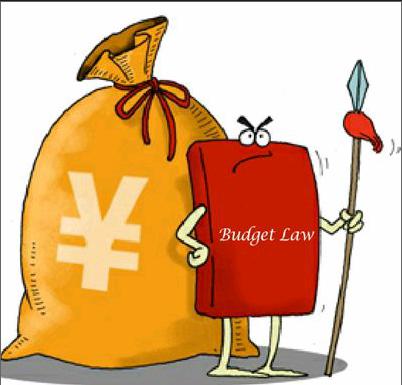Overhauling the Budget System
2014-10-23ByLiLi
By+Li+Li

Chinas top legislature has adopted a longawaited amendment to the Budget Law, which will put more stringent legal constraints on government income and spending. The move, according to fiscal scholars, is set to have far-reaching effects on the countrys fiscal balance and health. The new law will take effect on January 1, 2015.
The Budget Law has been informally dubbed the “Economic Constitution” worldwide. The recent revision will most likely prove to be a milestone in Chinas fiscal history, as it will make the governments distribution of fiscal funds more legally based and transparent.
The current Budget Law became effective in 1995. As the law is closely interrelated with Chinas ongoing fiscal reform, it took the country an uncharacteristically long time to revise it—seven years to draft a bill for the first reading in 2011 and a total of four readings to get it passed on August 31 by the Standing Committee of the National Peoples Congress (NPC).
In past decades, the countrys revenues and spending were divided into budgetary and extra-budgetary. Under such a dual-structure budgetary regime, some government departments enjoyed a great amount of leeway in managing public funds, which possibly led to corruption and the abuse of taxpayers money.
The revised law requires fiscal funds of all types to be subject to a unified budgetary system and stipulates that detailed budget information, including that of the Central Government and local authorities, as well as departments under them, must be publicized for public scrutiny.
Previously, budget information provided by some government departments was often too vague for legislators and the public to effectively supervise the management of fiscal funds. For example, during the annual NPC sessions, many deputies complained that some ministries only provided overall figures of their spending instead of detailed breakdowns, which made it virtually impossible for them to fulfill their supervisory role.
In 2014, Chinas total fiscal revenue is budgeted to be 13.9 trillion yuan ($2.26 trillion) and government spending to be more than 15 trillion yuan ($2.44 trillion).
The management of such a huge amount of public funds and supervision of its use remain key challenges.
The revision of the Budget Law represents a huge step forward in furthering fiscal reform and establishing a modern fiscal system, said Zhang Dejiang, Chairman of the NPC Standing Committee.
“The revision process took such a long time because a number of controversies concerning the direction of fiscal reform had not been settled then,” said Professor Liu Jianwen at Peking Universitys Law School. “If the ongoing reform had not been acknowledged by legislation, some new measures would have been held back.”
During the lengthy process of revising the Budget Law and in between the four readings, feedback from fiscal scholars regarding the successive amendment drafts was solicited. Their opinions, which focused on keeping the power of government departments in check and increasing fiscal transparency, have been largely reflected in the final version.
For example, the second draft, which came out in June 2012, deleted a clause that states the business of the central treasury shall be managed by the Peoples Bank of China, the central bank, which drew strong opposition from many fiscal scholars. The opponents believed that the change would reduce the supervisory role of the central bank on public funds, as the NPC had not established forceful supervision of public finance, which they maintained could in turn lead to a monopoly of power being held by the Ministry of Finance. After due consideration, their view was eventually accepted by lawmakers and the original stipulation has been upheld.
Li Weisen, a professor at the School of Economics of Shanghai-based Fudan University, who participated in the drafting process, said that although the new law failed to include the installation of a budget committee under the NPC as he suggested, progress is visible in the law. For example, the newly added Article 22 states that a special panel of a provincial-level legislature should conduct preliminary reviews on the draft budget and the implementation of the budget of the previous year, the revised draft budget and draft final accounts of the government at the corresponding level, and give comments.
The revised law has been expanded from the original 79 articles to 101. “As an overhaul, the revision has taken into account new practices and variables that have become relevant in the two decades or so since the current law took effect and conforms to the countrys overall fiscal system reform plan,”said yin Zhongqing, vice Chairman of the NPC Financial and Economic Committee. According to him, the reform plan, which was approved by the Political Bureau of the Communist Party of China Central Committee in June, is an important component of Chinas ongoing comprehensive reforms.
“The law has fundamentally changed from one defining the power division be-tween different government departments to one restricting government behavior,” yin told China Economic Weekly, a Beijing-based business journal.
Changes
The current Budget Law was enacted when China was still a planned economy and when the country was at an early stage of applying budget management. It contained only a very general definition of what the government budget properly covered, leaving huge room for interpretation by various government departments.
The revised law, on the other hand, divides the government budget into four parts, respectively for general purposes, government-managed funds, state-owned assets and social security funds.
For years, governments at all levels had only created budgets for general purposes, largely made up of tax revenues and spending on public services and government operations.
The revenues gained through transactions involving state-owned land use rights, which account for a large proportion of local government revenues, as well as finances of state-owned enterprises were not budgeted nor supervised by the legislatures.
Under the new law, revenues from transactions involving state-owned land use rights are covered by the budget for governmentmanaged funds, while the financial situations of state-owned enterprises are supervised through the budget for state-owned assets.
In 2013, the Central Government for the first time submitted its budget under the aforementioned four categories at the NPC annual session.
One of the most controversial issues regarding Chinas old fiscal system was how it regulated local government bonds. The current Budget Law bans local governments from issuing bonds, but in practice some local governments sought back doors to raising funds, mostly to fund infrastructure. The money raised from such efforts thusly remained unsupervised. In other cases, local governments have acted as guarantors for some borrowing, engendering great risks for public finance.
Chinas local government liabilities had grown to about 12 trillion yuan ($1.95 trillion) by the middle of last year, according to official estimates. Estimates by some economists may put an even larger figure on this.
Local governments are shouldering the heavy burden of repaying these debts, especially as a large proportion of them are set to mature this year and over the coming three years. Some researchers warn that a lapse in debt management may lead to defaults and trigger a widespread crisis.
To tackle this situation, the new law green-lights bond sales by provincial-level governments and applies strict conditions to the process. It not only restricts the amount of bonds that can be issued but also regulates how to issue them and how to use funds raised through bond sales.
Under the revised law, provincial governments are allowed to issue bonds within a quota set by the Central Government, subject to approval by the NPC or its standing committee.
Money raised by bond sales can only be used for public services, and not for daily government operations.
The debts must be included in the provincial budgets and supervised by the provincial legislatures.
The Central Government will assess risk in local debts. If these risks spin out of control, it has promised warnings, a fast response and punishment for those responsible.
Greater transparency
The revised law introduces detailed provisions to ensure the publics access to government budgetary information.
“The current law doesnt have any provisions concerning public supervision. The provisions to improve budget transparency are another highlight of the revised law,” said Wang Chaoying, head of the Economic Law Division of the Legislative Affairs Commission of the NPC Standing Committee.
The new law asks government at all levels to publish their budgets and final account reports within 20 days of being approved by the legislatures. It also gives the public access to information related to local government debts, purchases, budgets and audits.
The law also clearly regulates how the legislatures should examine the government budget reports and what to examine. It specifically asks the legislatures to examine major expense items and large investment projects as well as to inspect the development and efficiency of such expenditures.
“The effective implementation of a budget relies on the premise that it was soundly drafted,” said Bai Jingming, Deputy Director of the Institute for Fiscal Science Research under the Ministry of Finance. He said that as government departments can no longer make random adjustments to the budgets, their decision-making process will become more standardized and will not be dominated by the whims of individual officials.
